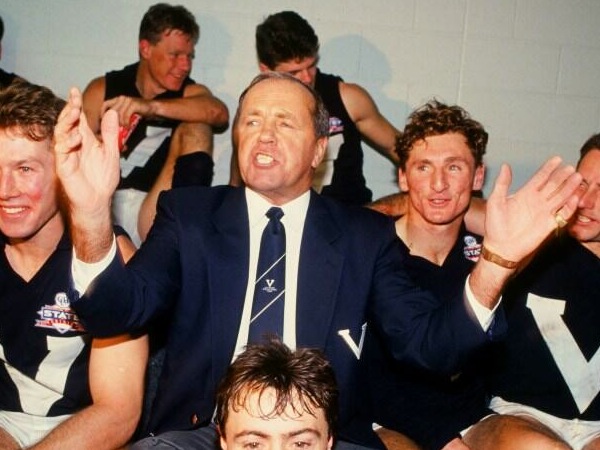For Rugby League followers, there’s nothing quite like State of Origin. Most AFL supporters who watched game one of the Queensland v New South Wales Origin series on Wednesday night could think about only one thing – could we again see State of Origin hold a place in the AFL.
There’s a multitude of issues surrounding Origin’s place in the AFL, but they all boil down to one real question: do people care about it?
After all, that’s what makes the Origin system work so well in League. The fans and the players love it, and there’s always a sense that these games matter.
When the AFL shelved the State of Origin concept in 1999, the games had begun to feel like exhibition matches – more novelty than rivalry. This was particularly evident after the “Allies” were introduced in 1994.
A host of big name players, such as Wayne Carey, seemed either disinterested or weren’t allowed to play because their clubs wouldn’t allow it.
This remains the biggest concern regarding State of Origin in the AFL. Most people seem to agree Origin would work if there was somehow a guarantee players wouldn’t get injured or suspended. Such an occurrence would impact the real season.
Obviously, no such guarantee can be given. There’s no such guarantee in Rugby League either.
On Wednesday night, New South Wales captain Paul Gallen blatantly punched Queensland’s Nate Myles, and will subsequently spend some time on the sidelines. But Gallen didn’t appear to regret the decision at all.
Why? Because in League, State of Origin is more important than the regular season.
It’s a shame the AFL doesn’t have the same passion for state of origin football anymore that the NRL has.#stateagainststate #mateagainstmate
— Campbell brown (@Browndogg_30x) June 5, 2013
AFL players seem to constantly be saying they want Origin back and would embrace it wholeheartedly if it were ever to return. But there’s a problem: most of them seem to be Victorian.
Collingwood’s Luke Ball, Brisbane’s Jonathon Brown and a host of others have suggested Origin should make a return, and they’d love to wear the Big V.
Other states don’t seem to share Victoria’s enthusiasm, but this hasn’t always been the case. The South Australians of old were a proud, tough and formidable opponent, and the Western Australian side – while not having quite the same talent to pick from – played with equal gusto.
But they were playing for the pride of their home state. How can you play as passionately when you’re only representing ‘the rest’ as the Allies – made up of players from Queensland, New South Wales, Northern Territory, Tasmania and the ACT – were when they came into the State of Origin competition in 1994?
For Origin to work, the other states need their own identity and purpose, and their own heroes. In other words, they need to find their own EJ Whitten.
A flashback photo to the great E.J Whitten leading the boys in song after a State of Origin victory? #AFL #Origin twitter.com/AFLPlayers/sta…
— AFL Players (@AFLPlayers) June 6, 2013
It’s not hard to understand why donning the Big V means more to people than wearing an Allies jumper. The Allies never stood for anything, and as long as they’re in the Origin conversation, Origin will seem like a Mickey Mouse idea.
If the match doesn’t mean anything, players won’t embrace it. If the players don’t embrace it, neither will the fans.
If Origin is to work in the AFL, it must be “state against state and mate against mate,” just as it is in League. For this to happen, other states must share Victoria’s enthusiasm.
And here’s where it gets interesting. The last few years – which have seen the introduction of teams in Greater Western Sydney and Gold Coast, two areas traditionally associated with sports other than AFL – have underlined AFL CEO Andrew Demetriou’s ultimate goal: to make AFL a truly national game.
Despite these new teams – and a rise in the success of other relatively new teams such as Fremantle and Port Adelaide – AFL is still a fair way off being embraced nationally. Having said that, the game is certainly more “national” than it was five years ago. Back then, it was more national than in the five years before that. There is no doubt the AFL is expanding.
So what if Demetriou achieves his goal, and the AFL becomes a truly national competition, where each state embraces the game the same way Victoria does?
Rivalries would inevitably develop, and from there perhaps Origin could be reborn.
While the initial push to turn the AFL into a national competition may have played a part in the death of State of Origin, it might now be the key to Origin’s potential rebirth.
Victorians are still reluctant to embrace the league’s newcomers – GWS and Gold Coast – but might feel a little differently if the expansion clubs are able to play a part in the return of State of Origin.
Because one thing’s for certain: Victorians miss the concept. That’s why we have this same discussion every year.
Sam McInerney is upstart’s deputy sport editor, and is studying a postgraduate diploma in journalism. You can follow him on Twitter: @SamuelMcInerney
Photo – Twitter: AFLPlayers








